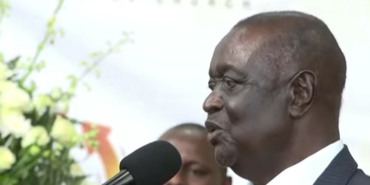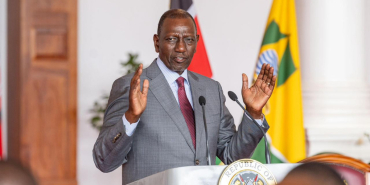Nairobi’s Gold Scam Industry Expands, Defrauds Investors of Billions

A burgeoning gold scam industry in Nairobi is ensnaring both local and international investors, raising serious concerns about the integrity of the East African financial hub and the effectiveness of current regulatory oversight.
The scams, characterised by elaborate deceptions and high-value losses, have prompted increased scrutiny from law enforcement agencies and calls for stricter regulations within Kenya's gold trade sector. Recent court cases paint a concerning picture of the scale and sophistication of these fraudulent operations. Businessman Abdi Mohammed's experience encapsulates the devastating impact of these schemes.
Lured by the promise of a lucrative gold acquisition from the Democratic Republic of Congo (DRC), Mohammed lost KSh2 million in a transaction that ultimately yielded nothing but salt. Three suspects, Kevin Mwachi, Morgan Asengi, and Mohamed Hassan, are now facing criminal charges of fraud and conspiracy in connection with Mohammed's case, highlighting the legal repercussions for those involved in these schemes.
However, Mohammed's experience is far from unique. Authorities have brought charges against at least 20 individuals, both Kenyan and foreign nationals, in the past six months alone, collectively accused of defrauding victims of approximately KSh5 billion through fraudulent gold deals. Nairobi, owing to its geographic centrality and developed infrastructural capacities, has emerged as a significant East African financial centre, attracting legitimate trade alongside sophisticated criminal enterprises. Gold fraud, in particular, has become a thriving component of the city's underground economy.
Scammers often operate from opulent offices in upscale neighbourhoods like Karen, Kilimani, Westlands, Muthaiga, and Runda. These locations are meticulously staged to exude legitimacy, complete with counterfeit government documents, protective gear, and convincing samples of gold bars. Such elaborate setups serve to deceive even the most experienced investors, creating a false sense of security and trustworthiness.
One of the most prominent cases under investigation involves a group of Dubai-based traders who were defrauded of KSh70 million. Six suspects, three Congolese nationals, Nfundiko Kamira Jean Marie, Peter Lukabaya Mulamba, and Ibrahim Nsangou, along with three Kenyans, Alan Zaphenia Onyango, Edward Leonard Ochieng, and Shem Omollo Onyango, allegedly defrauded representatives of an unnamed Dubai-based gold trader out of $546,000.
The deception unfolded over several days in March, during which the buyers were presented with video footage as proof of the gold deal's authenticity. They were also provided with receipts and introduced to Kristal Commodities Group, an entity falsely presented as the intermediary responsible for shipping the gold to Dubai. According to police investigator Leah Ambiche, the scammers possessed metallic boxes containing nuggets purportedly made of gold, along with weighing machines and an electronic gold tester gun.
To further enhance their credibility, the traders offered seven kilograms of gold as collateral, advising the buyers to store the items at Mysafe Place in Sarit Centre under mutual custody. Upon their return, however, the buyers discovered that their collateral had been replaced with worthless stones. Undeterred, the Dubai traders devised a counter-strategy to expose the fraudulent network. They approached one of the suspects with a new business proposal, offering to purchase an additional 500 kilograms of gold. This ultimately led to the suspect's arrest by the Directorate of Criminal Investigations (DCI), underscoring the risks involved in engaging in such criminal activities.
Another disturbing case involves Ibrahim Mohamed, who falsely claimed to be a government official working at the Directorate of Geological Surveys and Geo-Information Management. Mohamed, along with three accomplices, Felix Odhiambo, Derrick Omoke, and Moses Odhiambo, allegedly secured a $200,000 deposit from Voltex Commercial Trading Ltd, purportedly to cover storage and export costs for a 150-kilogram gold purchase.
Under the guise of legitimacy, the scammers provided the buyers with 3.5 kilograms of gold, stored in a safe within an apartment in Runda. Each party was given a key to the storage unit, further reinforcing the illusion of security. When the buyers returned, however, the contents of the safe had been replaced. Evidence presented in court revealed that the suspects brandished an array of items designed to deceive unsuspecting clients, including yellow metallic bars resembling gold, electronic gold tester guns, and counterfeit business documents bearing the Ministry of Mining's official logo.
The court proceedings revealed a disturbing pattern, with fraudsters not only imitating government documentation but also staging elaborate settings to make their operations convincingly authentic. The cases highlight a consistent modus operandi employed by gold scammers. They establish professional-looking establishments, complete with seals, fake certifications, and gold samples designed to appear authentic. They then use these props to manipulate buyers into paying hefty deposits to initiate deals, only to disappear with the funds or substitute the valuable gold with worthless metals.
Law enforcement agencies have struggled to keep pace with the evolving tactics of these fraudsters, as many criminals continuously adjust their methods to evade detection. Currently, several suspects are out on cash bail, with trials pending. Investigators are advocating for stronger deterrents, including harsher sentencing and stricter commercial regulations, to curb the rising trend of gold fraud.














Add new comment